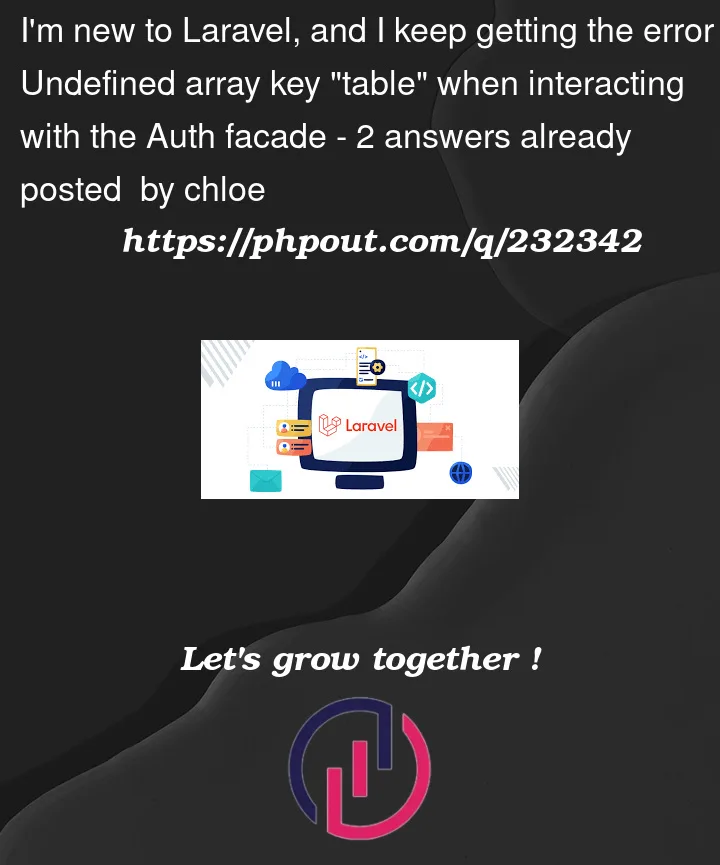I’m having a little bit of a problem, I was wondering if someone could help me out.
I’m trying to learn the Laravel PHP framework, however unfortunately, I can’t seem to accomplish a result.
I am trying to use the Auth::Check function to see if the user is authenticated, I am doing so in my routes as a sort of gate before giving them access to the webpage.
However I’m having an error message, and other people got it, but their answers aren’t solving it for me, and it mentions dependencies like Laravel/ui, but that’s not right, right? they tell you not to use it on a project you’re already working on.
The error appears to be related to IlluminateSupportFacadesAuth;
And it happens on this type of code:
public static function logout() {
Auth::logout();
setcookie('token', '', time() - 3600, "/");
return true;
}
Could someone help me out? I’m a little stumped. The internet talks a lot about this error, but none of them are quite obvious.
I tried deleting the cache, I also tried to look through the classes to see if any errors were visible.
Edit: Someone in the comments requested that I show my config, here they are:
APP_NAME='GPT Translate'
APP_ENV=local
APP_KEY=XXX
APP_DEBUG=true
APP_URL=http://localhost
LOG_CHANNEL=stack
LOG_DEPRECATIONS_CHANNEL=null
LOG_LEVEL=debug
DB_CONNECTION=mysql
DB_HOST=127.0.0.1
DB_PORT=3306
DB_DATABASE=gpt_translate
DB_USERNAME='root'
DB_PASSWORD='root'
BROADCAST_DRIVER=log
CACHE_DRIVER=file
FILESYSTEM_DISK=local
QUEUE_CONNECTION=database
SESSION_DRIVER=file
SESSION_LIFETIME=120
MEMCACHED_HOST=127.0.0.1
REDIS_HOST=127.0.0.1
REDIS_PASSWORD=null
REDIS_PORT=6379
MAIL_MAILER=smtp
MAIL_HOST=mailpit
MAIL_PORT=1025
MAIL_USERNAME=null
MAIL_PASSWORD=null
MAIL_ENCRYPTION=null
MAIL_FROM_ADDRESS="[email protected]"
MAIL_FROM_NAME="${APP_NAME}"
AWS_ACCESS_KEY_ID=
AWS_SECRET_ACCESS_KEY=
AWS_DEFAULT_REGION=us-east-1
AWS_BUCKET=
AWS_USE_PATH_STYLE_ENDPOINT=false
PUSHER_APP_ID=
PUSHER_APP_KEY=
PUSHER_APP_SECRET=
PUSHER_HOST=
PUSHER_PORT=443
PUSHER_SCHEME=https
PUSHER_APP_CLUSTER=mt1
VITE_PUSHER_APP_KEY="${PUSHER_APP_KEY}"
VITE_PUSHER_HOST="${PUSHER_HOST}"
VITE_PUSHER_PORT="${PUSHER_PORT}"
VITE_PUSHER_SCHEME="${PUSHER_SCHEME}"
VITE_PUSHER_APP_CLUSTER="${PUSHER_APP_CLUSTER}"
OPENAI_API_KEY='XXX'
Also, here is the code I’m experiencing the error in, It’s the logout function
<?php
namespace AppHttpControllers;
use IlluminateHttpRequest;
use AppModelsUser;
use IlluminateSupportFacadesHash;
use IlluminateSupportFacadesAuth;
use IlluminateSupportFacadesSession;
class CustomAuth extends Controller
{
public static function register($email, $name, $password) {
// Check if email already exists
$user = User::where('email', $email)->first();
if ($user) {
return response()->json([
'message' => 'Email already exists'
], 400);
}
// Create new user
$user = new User();
$user->email = $email;
$user->name = $name;
$user->password = Hash::make($password);
$user->save();
return true;
}
public static function login($email, $password) {
// Check if email exists
$user = User::where('email', $email)->first();
if (!$user) {
return false;
}
// Check if password is correct
if (!$user || !Hash::check($password, $user->password)) {
return false;
}
// Create token
$token = $user->createToken('auth_token')->plainTextToken;
// Set cookie
setcookie('token', $token, time() + (86400 * 30), "/");
// Set session variables
Session::put('username', $user->email);
Session::put('name', ucfirst($user->name));
Session::put('email', $user->email);
// Return token
return $token;
}
// Verify token
public static function verifyToken($token = false) {
// Connected Token
$connected_token = request()->cookie('token') ?? false;
$token = $connected_token ?? $token ?? false;
// Check if token exists
if (!$token) return false;
// Check if token is valid
$user = User::where('remember_token', $token)->first();
if (!$user) return false;
// Return
return true;
}
public static function logout() {
// Logout user use laravl auth (and sanctum)
Auth::logout();
}
}
Hope this helps!




2
Answers
Well there is an easier way to do so, you can use a middleware on the route you want to protect. That middleware is ‘auth’. More info: Middlewares in Laravel
I am not 100% sure, what are you trying to build. But, if you want to implement an API in Laravel that would be relevant: Sanctum
Here is a simplified version of your code:
You haven’t logged in with Authentication Faced. Your login function should be like.
You need to delete token when logout.